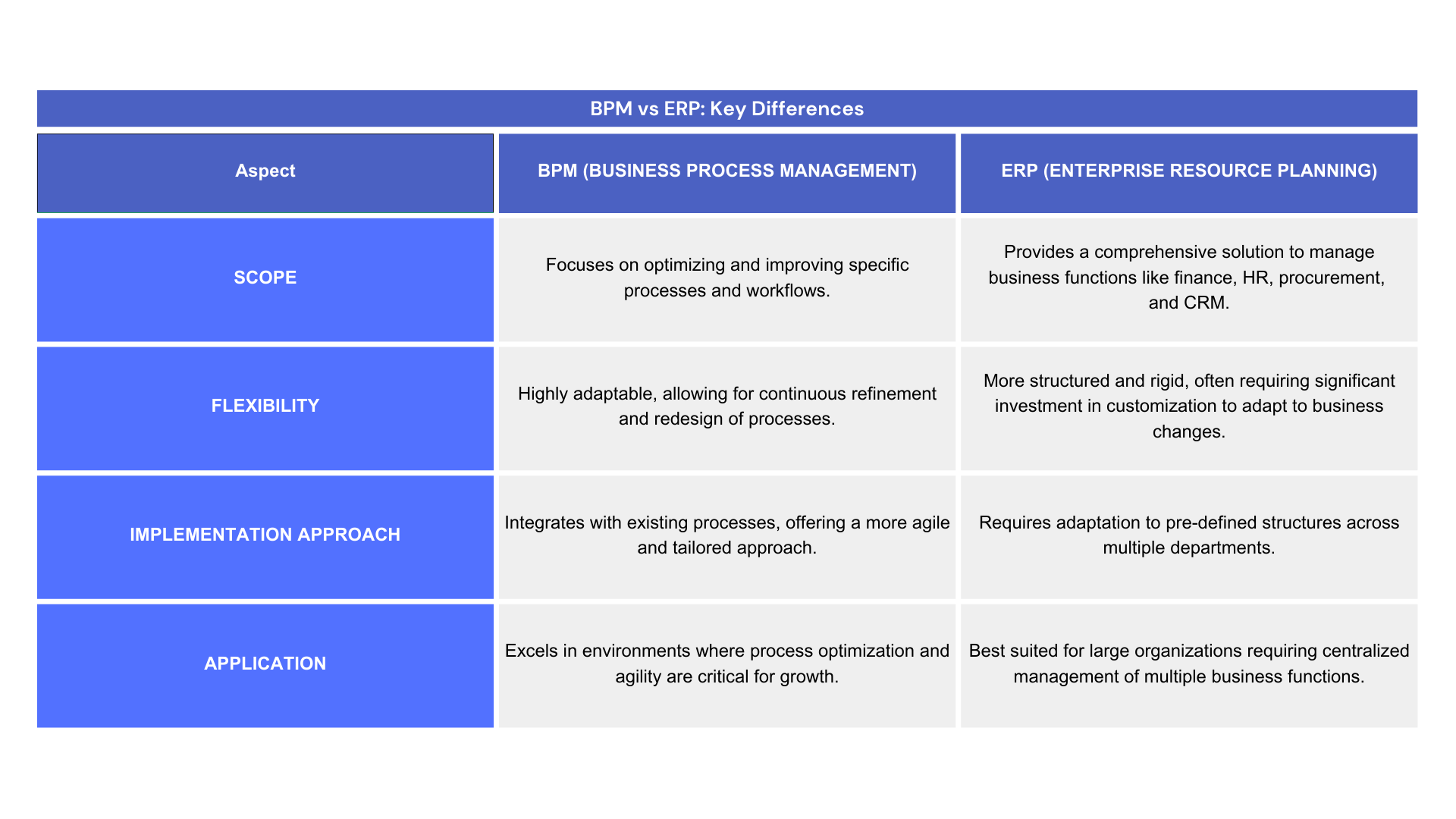BPM vs ERP: Why Every Business Leader Needs to Know the Difference
BPM and ERP systems are distinct yet complementary tools that address different business challenges, enabling efficiency and sustainable growth.
- BPM
- ERP
What is Business Process Management?
Let's begin with Business Process Management (BPM), a game-changing approach for companies looking to streamline operations and drive strategic growth. BPM isn't just about automation - it's about fundamentally changing the way work gets done. By focusing on optimizing tasks, managing workflows, and eliminating inefficiencies, BPM ensures that every process contributes directly to your company’s expansion while also increasing your ROI.
BPM software goes beyond identifying bottlenecks; it automates repetitive tasks, increases productivity, and provides a clear path to continuous improvement. From customer interactions to internal workflows, BPM solutions help document, analyze, and improve core business processes, unlocking untapped potential and making a real impact on the bottom line and long-term growth.
Learn more about How BPM Can Streamline Your Operations and Boost ROI
Why and When Do Companies Use BPM?
Business Process Management becomes a strategic imperative when the optimization of workflows is no longer optional, but crucial for competitiveness. BPM is ideal for companies dealing with complex, cross-departmental processes - whether it's streamlining customer service, automating production tasks or ensuring compliance with strict industry regulations. Its versatility makes BPM particularly valuable for companies that are in a constant state of change. It allows them to scale their operations efficiently, respond to new challenges and drive growth without the need for disruptive system overhauls.
With BPM, companies gain flexibility to evolve while maintaining control over their processes. This enables them to act quickly and effectively in an ever-changing marketplace.
What is Enterprise Resource Planning - ERP?
In contrast to Business Process Management (BPM), which focuses on optimizing specific workflows, Enterprise Resource Planning (ERP) is designed to integrate and streamline the core functions of a company. While BPM hones in on process efficiency, ERP system unifies key areas such as finance, human resources, supply chain, procurement and customer relationship management (CRM) into a single system.
This integration helps to ensure that resources are used efficiently. However, the real value lies in providing a central platform where data from different departments can be accessed and shared in real time. ERP increases transparency across the organization, facilitates communication, coordination and improves decision-making.
Why and When Do Companies Use ERP?
Companies typically turn to ERP systems when they need a consolidated platform to manage multiple business functions from a centralized database. ERP is especially helpful for companies that have outgrown their existing tools and need a more comprehensive, integrated solution to maximize cross-departmental collaboration.
Unlike the agile process optimization of BPM, ERP provides a way to make business operations efficient and seamless without the challenges of data silos. Even though it is not as flexible and tailored as BPM, ERP is highly valuable because it enables management to make informed decisions based on cross-functional information in real time, ensuring stability and efficiency across departments.
Where BPM and ERP Overlap
Both BPM and ERP aim to enhance operational efficiency and resource management, and there are several areas where they most obviously align:
Data Centralization
Both systems centralize data, breaking down silos and ensuring that everyone is working with the same, accurate information, which facilitates smoother communication and workflow.
Automation
Both BPM and ERP reduce the burden of manual tasks by automating processes when necessary, helping to minimize human error and speed up operations.
Improved Decision-Making
With comprehensive, real-time business insights, both BPM and ERP enable better decision-making by enabling executives to act on timely, reliable data.
BPM vs ERP: Key Differences
Although BPM and ERP system share the same overarching goal of increasing efficiency, they perform different roles within an organization, which differ significantly in scope and application:

If You Have to Pick One, Which Should You Choose?
There’s no universal solution when deciding between BPM and ERP. Each serves distinct purposes, and the ideal choice hinges onyour company’s specific objectives, budget and constraints. The most important factors to consider when choosing between BPM and ERP are:
Type of business
If you need a unified system to manage core functions such as finance, HR and supply chain, ERP system provides the structure and consistency you need across all departments.
Focus on process optimization
If your goal is to streamline and automate certain processes, BPM provides the flexibility to fine-tune workflows, especially for rapidly changing businesses.
Customization needs
If your business needs highly customizable workflows, BPM is ideal. ERP is suitable for companies looking for a standardized, cross-departmental solution with less need for customization.
So, if you’re already established player and need a comprehensive tool for managing functions like finance and HR, ERP may be your best bet. However, if your priority is to optimize workflows and adapt to the growth of your business, BPM offers the flexibility and efficiency you need.
Explore BPM Solutions on Dassault Systèmes Store
A Business Process Management (BPM) tool revolutionizes your company's operations. With a BPM solution, effortlessly model, automate, execute, monitor and optimize your business processes !

Business Process Management
Improve work life and optimize business performance by performing automated tasks
Bottom line: BPM is the Better Fit for Smaller, Growing Businesses
One size does not fit all. You have to choose the right fit, which ultimately depends on your organization's specific needs and goals. By understanding the strengths and differences between BPM and ERP system, companies can make informed decisions and invest in the solutions that will help them grow and succeed.
For smaller businesses, however, BPM is the more practical choice. It offers the agility, scalability, and cost-efficiency that startups and scale-ups need to stay competitive. While ERP system is suitable for larger companies with complex requirements, BPM empowers smaller companies to optimize processes, adapt quickly and build a foundation for long-term success.
FAQ about BPM Software vs ERP
Business Process Management (BPM) tools are comprehensive software solutions designed to model, automate, and improve organizational workflows. They transform manual processes into efficient digital workflows, offering real-time analytics, process simulation, and integration with other applications, helping businesses optimize efficiency while maintaining full operational visibility.
Yes, BPM and ERP can work together effectively. BPM optimizes and automates specific workflows, while ERP centralizes business functions, creating a complementary system for enhanced efficiency.
BPM is better for small businesses due to its flexibility, affordability, and focus on process optimization. ERP is often too complex and costly for smaller operations.
BPM generally requires minimal technical expertise and is easier to implement. ERP often demands specialized knowledge and IT support for setup and customization.
Yes, ERP is typically more expensive than BPM due to its comprehensive functionality, customization needs, and ongoing maintenance costs.y.
BPM is beneficial for industries focusing on process optimization, such as retail, healthcare, and IT. ERP is ideal for industries requiring centralized management, like manufacturing, logistics, and finance.




